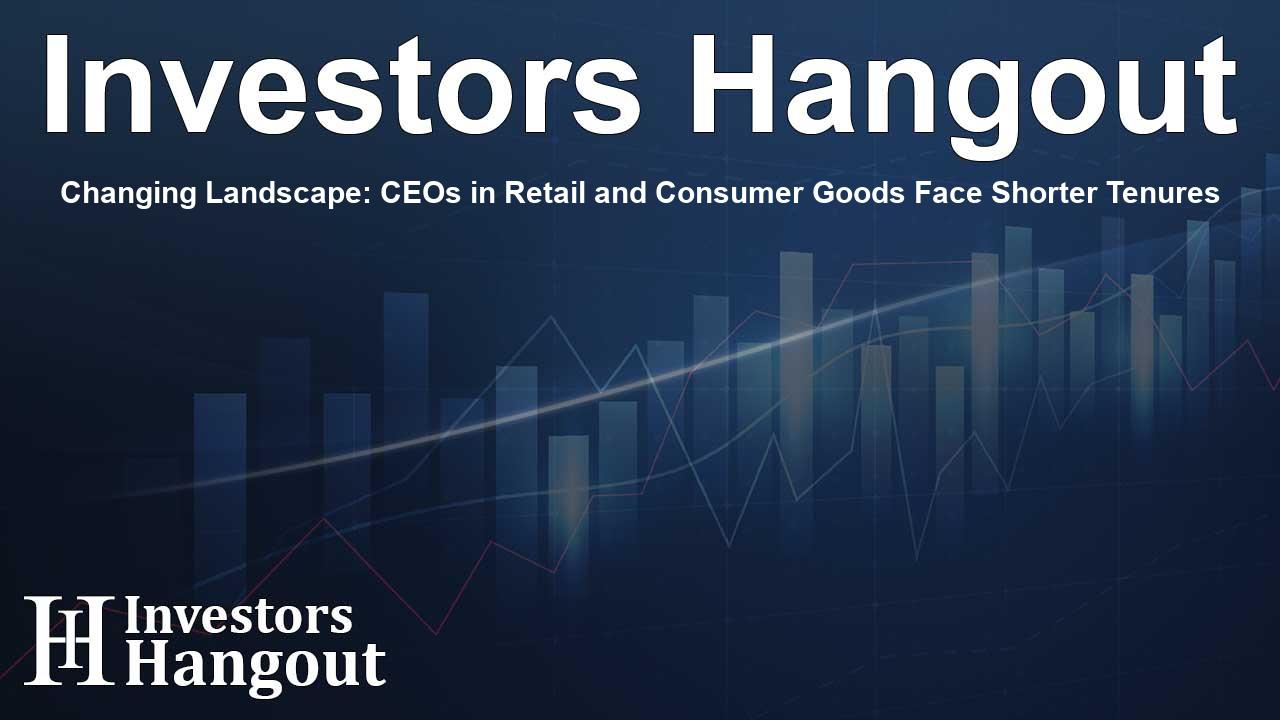Changing Landscape: CEOs in Retail and Consumer Goods Face Shorter Tenures

Changing Dynamics for CEOs in Retail and Consumer Goods
By Svea Herbst-Bayliss and Richa Naidu
The recent leadership changes at prominent retail and packaged food companies indicate a significant shift in corporate governance. Boards are increasingly willing to replace CEOs prematurely, often reacting more swiftly than before to pressures from activists and market forces.
Data from a leading executive compensation research firm shows that the average tenure for CEOs in U.S. retail and packaged goods is about 7 months shorter than their counterparts in industries such as automotive, finance, tech, and manufacturing. This evolving landscape mirrors a growing insistence from corporate boards for CEOs to deliver results faster in today’s competitive marketplace.
Consumer preferences are shifting rapidly, demanding innovation and effective performance. As shoppers become more discerning, CEOs find themselves with less time to prove their strategies and effectively lead their companies. Comments from experts highlight a notable impatience among board members, signaling a readiness to replace executives who fail to meet expectations.
The Influence of Economic Recovery on CEO Performance
Jim Rossman, who heads shareholder advisory at a global bank, emphasizes that there’s a heightened scrutiny on CEOs now that the economic climate is improving post-pandemic. Enhanced metrics allow boards to assess the effectiveness of their leadership more clearly, making non-performing CEOs more vulnerable to dismissal.
For instance, recently, Starbucks introduced new leadership after only 16 months under the previous CEO, underscoring the urgency felt by corporate boards. Similarly, Mark Schneider at Nestlé was removed as the company struggled with its stock performance in a rapidly changing market environment.
The Tenure of CEOs: A Comparative Look
According to the same research, while consumer packaged goods and retail CEOs have held their seats for an average of 7.7 years, finance industry CEOs generally enjoy longer tenures of about 10 years, and those in tech last nearly 9 years. This data suggests a growing trend within consumer sectors where immediate consumer satisfaction and performance have become paramount.
The Challenge of Activism in Consumer Markets
Investor pressure is an essential factor driving these quick changes in leadership. CEOs in consumer goods face immense responsibility not only to innovate but also to ensure consistent growth in a challenging market. Activist investors, as seen with Starbucks and Unilever, are becoming increasingly influential, prompting boards to take decisive action even when external pressures do not exist.
The Trend of Shorter Tenures: An Ongoing Shift?
As reported, several high-profile CEOs have found themselves dismissed sooner than expected. For instance, Alan Jope's five-year tenure at Unilever was cut short as the company faced operational challenges, with outside investors influencing decisions behind the scenes.
Bankers and executives observe that the current climate often doesn't allow for a smooth transition. Investors want signs of operational improvement, and one of the quickest ways to demonstrate change is through leadership adjustments. This acceleration in turnover reflects a broader trend within the industry where boards are more proactive than reactive.
Investor Activism and its Impacts
With an unprecedented rise in shareholder activism globally, many corporations are under pressure to act decisively to retain value and shareholder confidence. The recent declines in stock prices for companies like Nestlé and Starbucks highlight the stakes involved. Their rapid recovery upon leadership change further emphasizes the immediate need for boards to act under mounting investor scrutiny.
Conclusion: Keeping Pace with Market Changes
In summary, the pressure on CEOs in the consumer goods sector is increasing as both consumer tastes evolve and investor activism becomes more prominent. Boards are adapting to these challenges by making quicker decisions regarding their leadership. This dynamic reflects a new reality for CEOs who must navigate a landscape marked by increased expectations, rapid changes, and a demanding marketplace.
Frequently Asked Questions
1. Why are CEO tenures getting shorter?
CEO tenures are shorter due to increased board impatience, rapid consumer changes, and investor activism, compelling faster decision-making for leadership replacements.
2. What industries have longer CEO tenures compared to retail?
Finance and technology industries typically have longer CEO tenures, averaging around 10 years and 9 years, respectively, in contrast to retail and consumer goods.
3. How does investor pressure affect CEO performance?
Investor pressure prompts boards to act swiftly, leading to quicker dismissals of CEOs to restore shareholder confidence and demonstrate a commitment to improved performance.
4. What recent examples illustrate this trend?
Starbucks and Nestlé recently dismissed their CEOs amidst poor stock performance, highlighting how boards are acting before external pressure escalates.
5. How does the economy influence CEO effectiveness?
The economic recovery post-COVID has heightened scrutiny on CEOs, as better metrics allow boards to judge performance, increasing the risk of dismissal for non-performing leaders.
About The Author
Contact Caleb Price privately here. Or send an email with ATTN: Caleb Price as the subject to contact@investorshangout.com.
About Investors Hangout
Investors Hangout is a leading online stock forum for financial discussion and learning, offering a wide range of free tools and resources. It draws in traders of all levels, who exchange market knowledge, investigate trading tactics, and keep an eye on industry developments in real time. Featuring financial articles, stock message boards, quotes, charts, company profiles, and live news updates. Through cooperative learning and a wealth of informational resources, it helps users from novices creating their first portfolios to experts honing their techniques. Join Investors Hangout today: https://investorshangout.com/
The content of this article is based on factual, publicly available information and does not represent legal, financial, or investment advice. Investors Hangout does not offer financial advice, and the author is not a licensed financial advisor. Consult a qualified advisor before making any financial or investment decisions based on this article. This article should not be considered advice to purchase, sell, or hold any securities or other investments. If any of the material provided here is inaccurate, please contact us for corrections.
